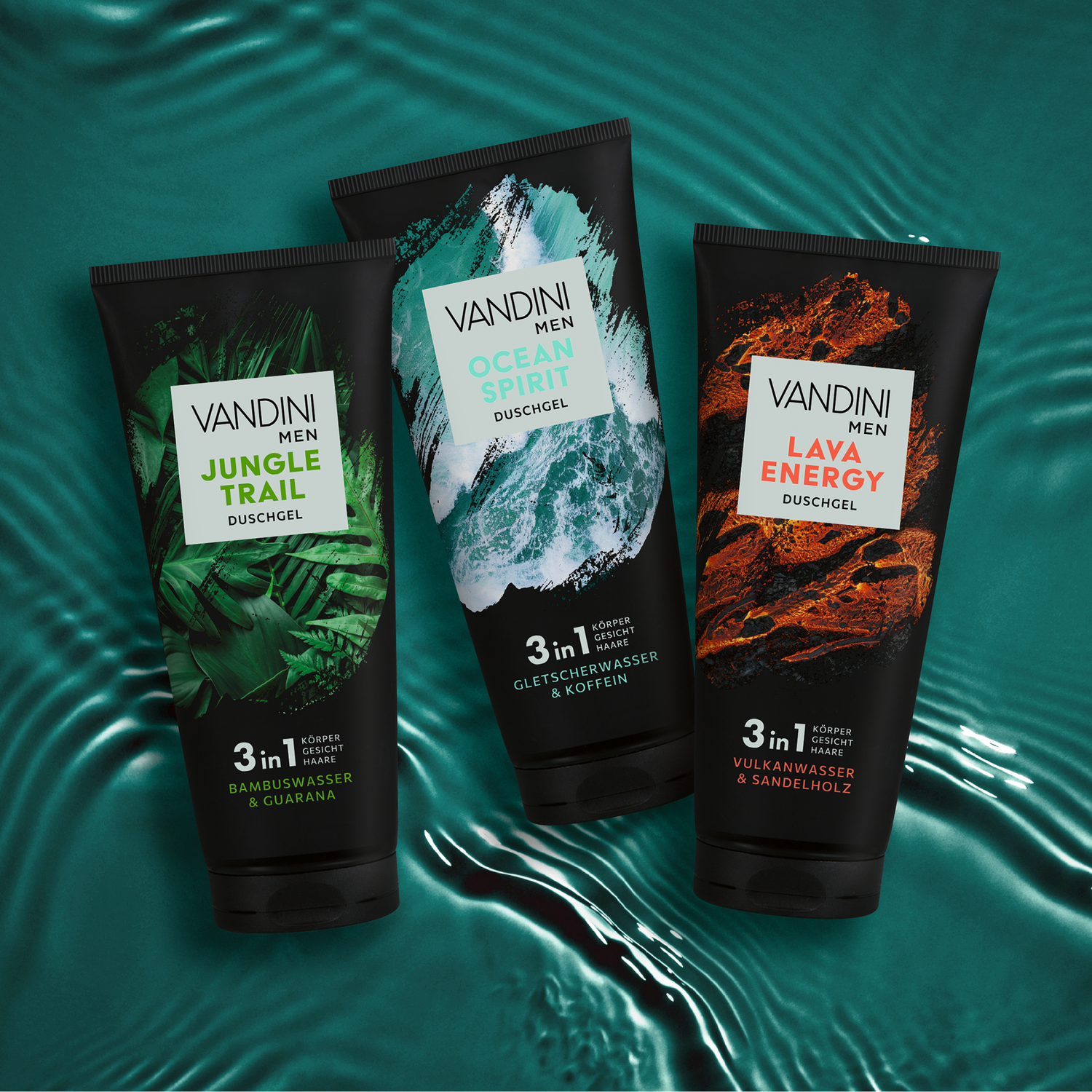
VANDINI
Körperpflege & Geschenksets: Sinnliche Düfte zum Verwöhnen & Verschenken
Unsere Bestseller
-
HYDRO Pflegedusche
Normaler Preis €3,99 EURNormaler Preis200 ml ( €19,95 / l ) -
NUTRI Body Lotion
Normaler Preis €4,99 EURNormaler Preis200 ml ( €24,95 / l ) -
COMFORT Pflegedusche
Normaler Preis €3,99 EURNormaler Preis200 ml ( €19,95 / l ) -

 Neu
NeuHYDRO Trio-Set
Normaler Preis €12,99 EURNormaler Preis475 ml ( €27,35 / l )
Einfach sinnlich duftend! VANDINI Körperpflegeprodukte bezaubern dich mit einzigartigen Duftkompositionen kombiniert mit feuchtigkeitsspendenden Pflegekomplexen.
VANDINI Serien

VANDINI
HYDRO
Magnolienblüte & Mandelmilch
Alle Pflegeprodukte der HYDRO-Serie umschmeicheln dich mit dem zarten Duft der Magnolienblüte. Die pflegenden und feuchtigkeitsspendenden Rezepturen sind mit Magnolienblütenwasser, Mandelmilch und einem HYDRO-Komplex angereichert. Unser Duschgele, Body Lotions und Handcremes spenden normaler bis trockener Haut wertvolle Feuchtigkeit - für ein spürbar geschmeidiges Hautgefühl.

VANDINI
COMFORT
Vanilleblüte & Macadamiaöl
Unsere COMFORT-Serie verführt dich mit ihrem sinnlich-süßen Duft der Vanilleblüte und pflegt gleichzeitig trockene, anspruchsvolle Haut. Die reichhaltigen Rezepturen der Pflegeduschen, Lotions und Handcremes mit Blütenwasser, Macadamiaöl und COMFORT-Komplex unterstützen die trockene, anspruchsvolle Haut. Die regenerierenden Formulierungen ziehen schnell ein und hinterlassen ein sanftes Pflegegefühl auf deiner Haut.

VANDINI
NUTRI
Pfingstrosenblüte & Arganöl
Lass dich verwöhnen vom Dufterlebnis der VANDINI NUTRI-Serie. Der blumige Duft der Pfingstrosenblüte schmeichelt den Sinnen, die reichhaltigen Rezepturen der Duschen, Body Lotions und Handcremes mit Rosenblütenwasser, Arganöl und NUTRI-Komplex spenden trockener Haut intensiven Schutz. Die nährenden Pflegeprodukte von NUTRI schenken zu Trockenheit neigender Haut optimale Pflege.

VANDINI
MEN
Power Düfte - Power Pflege!
Ob pflegend, belebend oder erfrischend - auch für den Mann hat VANDINI genau das Richtige. Die maskulinen 3in1 MEN Duschgele bieten effiziente Reinigung und Pflege für Körper, Gesicht und Haar für ein angenehmes Hautgefühl. Entscheide dich entweder für den sinnlich-würzigen Duft von LAVA ENERGY, den vitalisierend-aquatischen Duft von OCEAN SPIRIT oder das spritzig-frische Dufterlebnis von JUNGLE TRIAL.

VANDINI
GESCHENKE
Einfach Freude schenken!
Du bist auf der Suche nach einem außergewöhnlichen Geschenk? Du willst aber nicht schon wieder den x-ten Blumenstrauß mitbringen?
Dann hat VANDINI genau das Richtige für dich und für jeden Anlass. Mit unseren perfekt aufeinander abgestimmten und wunderschön verpackten Geschenksets mit attraktiven Zugaben verzauberst du deine Liebsten oder dich selbst.

Einfach Freude schenken! VANDINI Geschenksets vereinen feuchtigkeitsspendende Pflegeprodukte und bezaubernde Zugaben. Wunderschön verpackt, zaubern sie deinen Liebsten, Freunden oder dir selbst ein Lächeln ins Gesicht.
VANDINI Magazin
Alle anzeigen-

Was hilft gegen trockene Haut im Winter? Die be...
Der Winter steht vor der Tür. Egal, ob du ihn sehnlich erwartest oder schon vom nächsten Sommer träumst – deine Haut hat mit dem kalten Wind und der trockenen Luft...
Was hilft gegen trockene Haut im Winter? Die be...
Der Winter steht vor der Tür. Egal, ob du ihn sehnlich erwartest oder schon vom nächsten Sommer träumst – deine Haut hat mit dem kalten Wind und der trockenen Luft...
-

Dein Hauttyp und die passende Pflege
Fragen und Antworten rund um deinen Hauttyp und die passende Pflege Unsere Haut ist mit einer Fläche von etwa zwei Quadratmetern das größte Organ unseres Körpers und erfüllt zahlreiche lebenswichtige...
Dein Hauttyp und die passende Pflege
Fragen und Antworten rund um deinen Hauttyp und die passende Pflege Unsere Haut ist mit einer Fläche von etwa zwei Quadratmetern das größte Organ unseres Körpers und erfüllt zahlreiche lebenswichtige...
-

Welcher Dufttyp bin ich?
Der Duft von Magnolienblüten riecht für dich leicht exotisch und versetzt dich in ferne Länder? Oder magst du den Duft nach Vanille lieber, weil er ein angenehmes, wohliges Gefühl in...
Welcher Dufttyp bin ich?
Der Duft von Magnolienblüten riecht für dich leicht exotisch und versetzt dich in ferne Länder? Oder magst du den Duft nach Vanille lieber, weil er ein angenehmes, wohliges Gefühl in...










